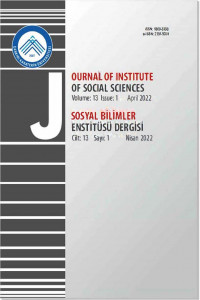Research Article
Issue Editorial Board
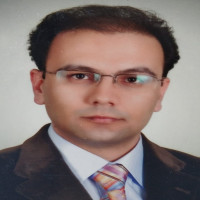
He graduated from the Department of Librarianship, Faculty of Letters, Hacettepe University in 1994. He started working as a research assistant at the Department of Librarianship, Atatürk University in 1996. He completed her master's degree in 1999 and her doctorate in 2005 at the Department of Information and Document Management, Hacettepe University. He was appointed to the Department of Librarianship, Atatürk University as an assistant professor in 2006 and as an associate professor in 2011. He transferred to the Department of Information Management, Çankırı Karatekin University as an associate professor in 2014 and was appointed as a professor at the same university in 2016. He has publications and projects on information literacy, public libraries, reading habits, open access, university libraries and content analysis. He is a member of the referee boards of some scientific journals. He currently serves as the Dean of Humanities and Social Sciences at Çankırı Karatekin University and the Head of the Department of Information Management.

Aim & Scope
The purpose of the Journal of the Institute of Social Sciences (JISS/SBED) is to provide academic studies in a scientific framework which are prepared in the fields of social sciences such as language, literature, history, education, sociology, philosophy, economics, business, politics, communication.
The Journal of the Institute of Social Sciences (JISS/SBED) is a publication of Çankırı Karatekin University Institute of Social Sciences. Çankırı Karatekin University Journal of the Institute of Social Sciences is a refereed journal which is published twice a year (April, November). SBED covers all kinds of work in the field of Social Sciences. The journal covers theoretical and analytical studies. All articles submitted to the journal are evaluated by at least two independent referees. The accepted languages of the published articles in the journal is Turkish and English.
Author Guidelines
Ethical Principles and Publication Policy
PUBLICATION POLICY
The articles sent to Çankırı Karatekin University Journal of Social Sciences Institute are firstly examined in terms of writing rules and ethical principles during the preliminary review process. Articles that are found to be in compliance with the publication policies of our journal are directed to the referees. Blind refereeing rules are applied in the refereeing process. Articles for which revisions are requested in peer-review reports are forwarded to the authors to complete the revisions. The article is sent to the referees who want to re-evaluate after the revision. As a result of the referee evaluations, the articles that are approved for publication by at least two referees are included in the publication process.
PUBLICATION ETHICS
The publication processes implemented in the Journal of Çankırı Karatekin Institute of Social Sciences form the basis for the development and distribution of information in an impartial and respectable manner. The processes implemented in this direction are directly reflected in the quality of the work of the authors and the institutions that support the authors. Peer-reviewed studies are studies that embody and support the scientific method. At this point, it is important that all stakeholders of the process (authors, readers and researchers, publisher, referees and editors) comply with the standards for ethical principles. Within the scope of publication ethics of the Journal of the Institute of Social Sciences, all stakeholders are expected to bear the following ethical responsibilities.
The ethical duties and responsibilities listed below have been prepared as open access, taking into account the guidelines and policies published by the Committee on Publication Ethics (COPE).
writers
o It is the author's responsibility to ensure that the submitted article will contribute to academic fields.
o Studies must be original and based on research.
o Although the plagiarism screening will be done by the journal, the consequences of plagiarism, which is academic dishonor, will be entirely directed to the author.
o The article should not be sent to different journals at the same time and should not have been sent to another journal before.
o It should be ensured that other authors whose names will be written in the article contribute to the research.
o It is against scientific ethics to show non-academic contributors as additional authors or to rank authors based on non-scientific criteria such as title, age and gender, regardless of the order of contribution.
o It is assumed that the authors who submit articles to the journal have read and accepted the publication and writing principles of the journal, and the authors are deemed to have committed to what is expected of them in these principles.
o Citations and bibliography must be complete.
o Authors should take into account the Scientific Research and Publication Ethics Directive, which is also stated by the Council of Higher Education.
Referees
o Referees should act with the awareness that they are the main determinants of the academic quality of the article to be published in the journal, and should evaluate with the responsibility of increasing the academic quality.
o Reviewers should only accept refereeing of articles for which they have the necessary expertise to conduct an appropriate evaluation, can observe the confidentiality of blind peer review, and keep the details of the article confidential at all times.
o After the article review process, any information about the reviewed article should never be shared with others.
o Reviewers should only evaluate the accuracy of the content of the articles and their compliance with academic criteria. The fact that the opinions expressed in the article are different from the opinions of the referee should not affect the evaluation.
o Referee reports should be objective and measured. Insulting, derogatory and accusatory expressions should definitely be avoided.
o Referees should avoid superficial and vague expressions in their evaluation reports. In the evaluations with negative results, the deficient and faulty points on which the result is based should be shown in a concrete way.
o The referees should evaluate the articles within the time allotted to them. If they are not going to review, they should notify the journal within a reasonable time.
Editors
o Editors should accept articles that will contribute to the relevant fields specified in the journal policy to the evaluation process.
o Editors should not have any conflict of interest/relationship with accepted or rejected articles.
o Editors have full responsibility and authority to accept or reject an article.
o It is the editors' responsibility to keep the names of the referees and authors mutually confidential.
o Editors should make every effort to screen for plagiarism of articles submitted for publication and thus to prevent academic dishonesty.
o It is the duty of the editors to complete the preliminary review, refereeing, editing and publishing processes of the articles submitted to the journal in a timely and healthy manner.
o Editors should prioritize academic concerns and criteria when accepting articles for the journal.
Similarity Report / Plagiarism Scan
Articles submitted for publication to the Journal of the Institute of Social Sciences are subject to double-blind peer-review evaluation by at least two referees. In addition, it is confirmed that the articles have not been published before and do not contain plagiarism, through the iThenticate or Turnitin program used for plagiarism detection. Studies in which plagiarism is detected are rejected by the Social Sciences Institute Journal Editorial.
ETHICS COMMITTEE PERMISSION
ULAKBİM (TR Index) has added some articles about ethical rules to its 2020 criteria. These regulations are summarized below. Please send your candidate articles by editing them according to these articles. Our authors are required to provide the relevant documents for their studies that require ethics committee approval and upload them to the system with their studies.
1. "Ethics Committee Permission" is required for all kinds of research conducted with qualitative or quantitative approaches that require data collection from the participants by using survey, interview, focus group work, observation, experiment and interview techniques.
2. In the articles, it should be stated whether ethical committee permission and/or legal/special permission is required. If it is necessary to obtain these permissions, it should be clearly stated from which institution, on what date and with which decision or number number the permission was obtained.
3. "Ethics Committee Permission" is required for research in which humans and animals (including material/data) are used for experimental or other scientific purposes.
4. If the study requires the use of human or animal subjects, international declaration, guide, etc. should be declared appropriate.
5. "Ethics Committee Permission" is required for clinical studies on humans and studies on animals.
6. In accordance with the law on the protection of personal data, "Ethics Committee Permission" is required for retrospective studies.
* Non-university researchers can also apply to the Ethics Committees in their regions.
ACCESS INFORMATION
Researchers who want to contribute an article to Çankırı Karatekin University Journal of Social Sciences Institute can access it from the link https://dergipark.org.tr/tr/pub/jiss. In addition, for all kinds of problems and information sharing, they can contact sbedergi@karatekin.edu.tr e-mail address.
Journal of Çankırı Karatekin University Institute of Social Sciences
Rectorate Institutes Building Yeni Mahalle, 15 July Martyrs Boulevard No:10 18200 Center / ÇANKIRI
sbedergi@karatekin.edu.tr
0 (376) 213 26 26 ext 4218 // 4204 // 4045
Price Policy
No fee is charged for article submission, article processing and publication. Internet access to full texts in Turkish and English is free of charge.
Indexes
Citation Indexes
Journal Boards
Editor
Issue Editor
Editor Assistant

Editorial Board
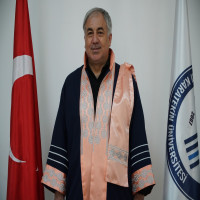
Prof. Dr. Ertan Beşe
1985 yılında girdiği İstanbul Üniversitesi Siyasal Bilgiler Fakültesi ‘Kamu Yönetimi’ Bölümü’nden, 1989 yılında mezun oldu. 18 Ocak 1991’de Polis Akademisi’nde ‘Araştırma Görevlisi’ olarak göreve başladı. University of Wales, Aberystwyth Hukuk Fakültesi’nde “General Aspects of Contemporary Political Terrorism and State Responses” adlı tezini, 1994 yılı başında tamamlayarak, ‘Kamu Hukuku’ alanında LL-M (Hukuk Mastırı) derecesi aldı.
İstanbul Üniversitesi Sosyal Bilimler Enstitüsü ‘Avrupa Topluluğu’ Anabilim Dalı’nda yürütmekte olduğu ‘Doktora’ çalışmalarını, Temmuz 2001’de “Avrupa Birliği Açısından Terörle Mücadele ve İnsan Hakları” başlıklı doktora teziyle tamamladı.
27 Mayıs 2002 tarihinde Polis Akademisi Güvenlik Bilimleri Fakültesi kadrosunda ‘Kriminoloji’ alanında Yrd. Doçent olarak atandı.
Mart 2005’de Orta Doğu Teknik Üniversitesi Sosyal Bilimler Enstitüsü Sosyoloji Bölümü’nde ‘Sociological Analysis of Organized Criminality in Turkey’ başlıklı teziyle ‘ikinci doktora’ derecesini aldı. 09.10.2006 tarihinde ‘Sosyoloji’ dalında ‘DOÇENT’ oldu.
11 Şubat 2012 tarihinde PROFESÖR olan Ertan BEŞE; 1996 yılından itibaren Polis Akademisi Güvenlik Bilimleri Fakültesi’nde lisans düzeyinde ‘Kriminoloji’, ‘Terörizm’, ‘Organize Suçlar’, ‘Sosyoloji’; Güvenlik Bilimleri Enstitüsü’nde Yüksek Lisans düzeyinde ‘Siyasal Şiddet ve Terörizm’, ‘Uluslararası Hukuk ve Terörizm’ ve Suç Sosyolojisi ve doktora düzeyinde de ‘Etnisite, Ulus-Devlet ve Terörizm’ ve ‘Uluslararası Politika ve Terörizm’ dersleri verdi.
Ayrıca İstanbul Aydın Üniversitesi Sosyal Bilimler Enstitüsü Siyaset Bilimi ve Uluslararası İlişkiler Ana Bilim Dalı Uluslararası İlişkiler ve Terörizm Araştırmaları Programı’nda Yüksek Lisans Düzeyinde ‘Siyasal Şiddet ve Terörizm’, ‘Türk İstihbarat Tarihi ve Karşılaştırmalı İstihbarat Örgütleri’ ve ‘Uluslararası İlişkilerde Güvenlik Yaklaşımları’ dersleri verdi.
Prof. Dr. Ertan BEŞE, Temmuz 2010 tarihinden Temmuz 2012 tarihine kadar Kamu Düzeni ve Güvenliği Müsteşarlığı’nda AR-GE Daire Başkanı olarak görev yapmıştır. 2012 -2013 yıllarında Polis Akademisi Güvenlik Bilimleri Enstitüsü Müdürü olarak görev yapan Ertan BEŞE; 2013 - 2014 yıllarında Polis Akademisi Güvenlik Bilimleri Fakültesi Dekanlığı yapmıştır. Fırat Üniversitesi İktisadi ve İdari Bilimler Fakültesi, Siyaset Bilimi ve Kamu Yönetimi Bölümü’nde de bir dönem öğretim üyeliği yapan Prof. Dr. Ertan BEŞE; 2016 - 2019 yılları arasında İstanbul Üniversitesi Siyasal Bilgiler Fakültesi, Siyaset Bilimi ve Kamu Yönetimi Bölümü’nde öğretim üyeliği görevinde bulunmuştur.
Ayrıca, Stratejik Düşünce Enstitüsü (SDE)’nün ‘Güvenlik ve Terörizm’ masasının kurucusu olup, bu kurumda 2009 - 2013 yılları arasında da Masa Başkanı ve Uzman olarak çalışmıştır.
Halihazırda Çankırı Karatekin Üniversitesi İktisadi ve İdari Bilimler Fakültesi Siyaset Bilimi ve Kamu Yönetimi Bölüm Başkanıdır.
Ertan BEŞE’nin akademik ilgi alanları; özellikle, ‘Siyasal Şiddet ve Terörizm’, Stratejik İstihbarat, Güvenlik Stratejileri, İstihbarat, Toplumsal Hareketler, Suç Sosyolojisi, ‘Organize Suçlar’ ve ‘Kriminoloji’dir. Bu alanlarda yayınlanmış kitap, makale, bildiri ve araştırma yazıları bulunmaktadır.

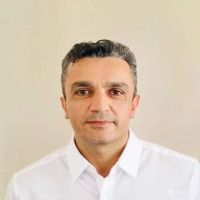





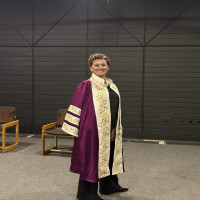
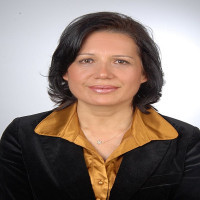

Advisory Board



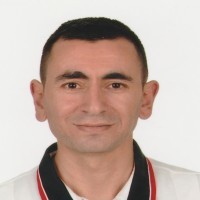

Mürsel Bayram received his bachelor’s, master’s and doctoral degrees from Selçuk
University, Ahi Evran University and Kırıkkale University respectively. He is currently the Head of the Department of African Studies at the Institute for Area Studies, Social Sciences University of Ankara. He is the author of Une histoire diplomatique des États ouest-africains and Çin-Afrika İş Birliği (China-Africa Cooperation). Bayram is also the editor of the books titled Mağrib Diplomasisi (Maghreb Diplomacy) Afrika Yıllığı 2021 (Africa Yearbook 2021), Afrika Yıllığı 2022 (Africa Yearbook 2022), Afrika’da Politika ve Uluslararası İlişkiler (African Politics and International Relations) and Doğu Afrika’da Siyaset ve Diplomasi (Politics and Diplomacy in East Africa).
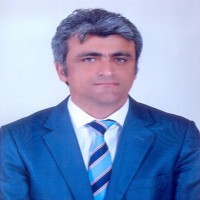




 Web
Web
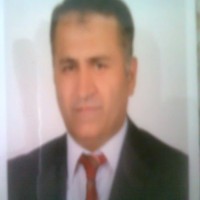
Doç. Dr. İSMAİL EFE
1972 yılında Sinop Durağan’da doğan yazar, ilk ve orta
öğrenimini burada tamamladı. 1998–99 Eğitim öğretim yılında
Kırıkkale Üniversitesi Fen Edebiyat Fakültesi Tarih Bölümü’nden
mezun oldu. 1999-2007 yılları arasında Kırıkkale Üniversitesi
Fen Edebiyat Fakültesi Tarih Bölümü Türkiye Cumhuriyeti
Tarihi Ana Bilim Dalı’nda Araştırma Görevlisi olarak çalıştı.
2008 yılında Kırıkkale Üniversitesi Atatürk İlkeleri ve İnkılap
Tarihi Bölümü’nde Öğretim Görevlisi olarak çalışmaya başladı ve
halen bu görevine devam etmektedir. 2004 yılında Kırıkkale
Üniversitesi Sosyal Bilimler Enstitüsü’nde Yüksek Lisansını
tamamladı. 2015 yılında Erciyes Üniversitesi Sosyal Bilimler
Enstitüsü Türkiye Cumhuriyeti Tarihi Ana Bilim Dalı’nda
doktora eğitimini tamamlayarak Dr. Unvanını aldı. 2020 yılında
Atatürk İlkeleri ve Cumhuriyet Tarihi alanında Doçent unvanı
alan yazarın, 2018 yılında yayınlanmış olan “Sinop Tarihi”
konulu kitabı, çeşitli dergilerde yayınlanan makaleleri, kitap
bölümleri ve çok sayıda sempozyum ve kongrede sunduğu
tebliğleri, yürütücü ve araştırmacı olarak yer aldığı projeleri
bulunmaktadır.
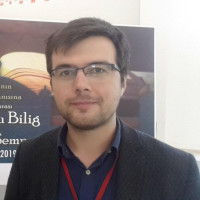
1990 yılında İzmir'de doğdu. İlk ve orta öğretimi burada gördü. Lisans eğitimini Boğaziçi Üniversitesi Tarih Bölümünü yüksek onur derecesiyle tamamladı. 2013 yılı Aralık ayında ÖYP programı kapsamında Kırıkkale Üniversitesi'nde araştırma görevlisi olarak çalışmaya başladı. 2014-2016 yılları arasında Kırıkkale Üniversitesi Sosyal Bilimler Enstitüsü Tarih Anabilimdalı'nda Yüksek Lisansını yaptı. Aynı yıl Kırıkkale Üniversitesi Sosyal Bilimler Enstitüsü Tarih Anabilimdalı'nda doktoraya başladı ve 2022 yılında bu eğitimini tamamlayarak doktor unvanını aldı. 2023 yılında Kırıkkale Üniversitesi Tarih Bölümünde Dr. öğretim üyesi olarak atandı ve halen bu görevde çalışmaktadır. C1 seviyesinde İngilizce ve B1 seviyesinde Fransızca bilmektedir. Evli ve bir çocuk babasıdır.


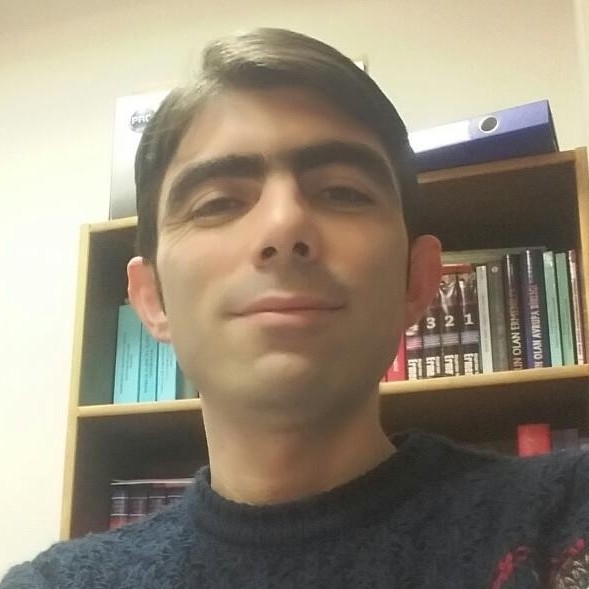
İlkokulu, orta ve lise tahsilini Kayseri’de tamamladı. Yüksek tahsilini Kayseri-Erciyes Üniversitesi’nde tamamlayarak 1980 tarihinde mezun oldu. İlk öğretmenliğe 1983 tarihinde Kars ili Selim Lisesi’nde stajyer olarak başladı. 1986 tarihinde Kayseri’nin Tomarza İlçesi'nde, 1988 tarihinde ise yine Kayseri'nin Hacılar ilçesinde öğretmenliğe devam etti. 1989 tarihinde Erciyes Üniversitesi Sosyal Bilimler Enstitüsü’nde yüksek lisansa başladı. Yüksek lisansı “İslâm Savaş Esasları ve Bunun Birleşmiş Milletler Esaslarına Yansıması”çalışması ile tamamladı. 1992 tarihinde Erciyes Üniversitesi Sosyal Bilimler Enstitüsü’nde doktora programına başladı. 1996 tarihinde doktorasını "1876-1918 Yılları arası Ortadoğu ve Halep" isimli tezi ile tamamladı. Doktoradan bir müddet sonra Gazi Üniversitesi Kırşehir Eğitim Fakültesi Tarih Eğitimi Anabilim Dalı’nda Yardımcı Doçent olarak göreve başladı. 2007 Öğretim yılına kadar görevini Eğitim Fakültesi Sosyal Bilgiler Öğretmenliği Anabilim Dalı’nda sürdürdü. 2007-2008 öğretim yılından itibaren kadrosu Eğitim Fakültesi’nde kalmak şartı ile Ahi Evran Üniversitesi Fen Edebiyat Fakültesi Tarih Bölümü’nde göreve başladı. 23 Ekim 2019 tarihinde doçentliği alınca Fen Edebiyat Fakültesi Tarih Bölümü’ne kadrolu olarak ataması yapıldı ve hâlen Tarih Bölümü Yakın Çağ Ana Bilim Dalı’nda görevini sürdürmektedir.
Türkçe,İngilizce,Azerbaycan Türkçesi




